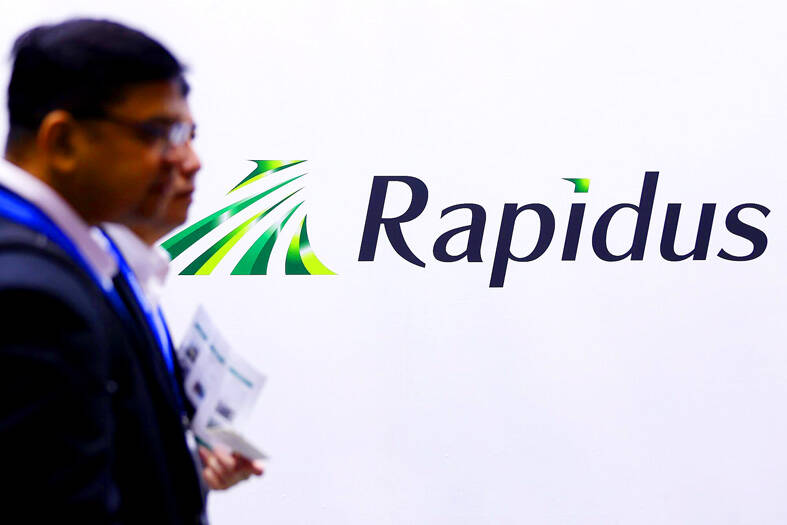Japan is preparing as much as ¥802.5 billion (US$5.4 billion) in additional aid for chip start-up Rapidus Corp, a move that reflects Tokyo’s growing resolve to secure semiconductors during a time of heightened US-China tensions.
That brings the total amount of public money earmarked for the country’s effort to build an advanced chip contractor to a maximum ¥1.72 trillion, plus another ¥100 billion that has been proposed. The Japanese Ministry of Economy, Trade and Industry is also pushing for debt guarantees to encourage more private sector investment into the fledgling company.
Most of the world’s advanced logic chips used to develop artificial intelligence (AI) are manufactured by Taiwan Semiconductor Manufacturing Co (台積電), sparking concerns about global reliance on Taiwan. Those fears, coupled with US President Donald Trump’s “America first” campaign, are also fueling a sense of urgency in Japan that’s helping Rapidus.

Photo: Bloomberg
For the fiscal year starting this month, the Japanese ministry approved as much as ¥675.5 billion of additional support for front-end processing, which fabricates silicon wafers before they are cut into individual chip, and another ¥127 billion for back-end processing, which includes chip packaging and testing. That public aid would likely decline beginning in the following business year, ministry officials said.
“We are hopeful that private-sector support will emerge in the coming fiscal year,” Hisashi Kanazashi, director of the ministry’s IT industry division, told reporters yesterday. Such fundraising talks with possible corporate and financial partners are proceeding as planned, he added.
Rapidus is on track to begin operating a pilot line this month and would begin processing the first batch of wafers before summer, he added.
The start-up, backed by Toyota Motor Corp, Sony Group Corp and Softbank Corp, aims to begin mass production of next-generation chips in 2027, a highly ambitious target.
Japan has pledged about ¥5.4 trillion in an attempt to claw back some of its former leadership in chip technology. The country still has a leading market share in silicon wafers, as well as in certain chip materials and gear, but has ceded supremacy in the more lucrative parts of semiconductor design and production to chipmakers in the US and Taiwan.
Japanese Prime Minister Shigeru Ishiba has promised fresh public support for the country’s chip and AI sectors, and a bill to enable loan guarantees and an issuance of government bonds tied to the energy special account is expected to be submitted to the Japanese Diet during the current session set to end in June.
The Diet is slated to approve about ¥333 billion in the fiscal year starting this month geared at boosting the country’s chip and AI sectors.

South Korea’s equity benchmark yesterday crossed a new milestone just a month after surpassing the once-unthinkable 5,000 mark as surging global memory demand powers the country’s biggest chipmakers. The KOSPI advanced as much as 2.6 percent to a record 6,123, with Samsung Electronics Co and SK Hynix Inc each gaining more than 2 percent. With the benchmark now up 45 percent this year, South Korea’s stock market capitalization has also moved past France’s, following last month’s overtaking of Germany’s. Long overlooked by foreign funds, despite being undervalued, South Korean stocks have now emerged as clear winners in the global market. The so-called “artificial intelligence

NEW IDENTITY: Known for its software, India has expanded into hardware, with its semiconductor industry growing from US$38bn in 2023 to US$45bn to US$50bn India on Saturday inaugurated its first semiconductor assembly and test facility, a milestone in the government’s push to reduce dependence on foreign chipmakers and stake a claim in a sector dominated by China. Indian Prime Minister Narendra Modi opened US firm Micron Technology Inc’s semiconductor assembly, test and packaging unit in his home state of Gujarat, hailing the “dawn of a new era” for India’s technology ambitions. “When young Indians look back in the future, they will see this decade as the turning point in our tech future,” Modi told the event, which was broadcast on his YouTube channel. The plant would convert

‘SEISMIC SHIFT’: The researcher forecast there would be about 1.1 billion mobile shipments this year, down from 1.26 billion the prior year and erasing years of gains The global smartphone market is expected to contract 12.9 percent this year due to the unprecedented memorychip shortage, marking “a crisis like no other,” researcher International Data Corp (IDC) said. The new forecast, a dramatic revision down from earlier estimates, gives the latest accounting of the ongoing memory crunch that is affecting every corner of the electronics industry. The demand for advanced memory to power artificial intelligence (AI) tasks has drained global supply until well into next year and jeopardizes the business model of many smartphone makers. IDC forecast about 1.1 billion mobile shipments this year, down from 1.26 billion the prior

People stand in a Pokemon store in Tokyo on Thursday. One of the world highest-grossing franchises is celebrated its 30th anniversary yesterday.